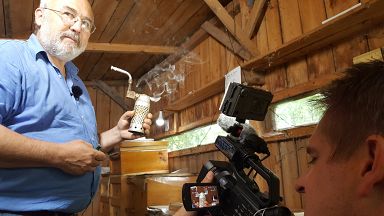An otherwise conservative region in Germany has seen a surge in Green Party voters in the last EU election. In this feature of Insiders, meet the Christians who have thrown their support behind the left-wing party.
The German Green Party has experienced a surge in support across Germany in the last year and particularly in the last EU election. They now control over 20% of the seats from Germany's delegation to the European Parliament. That's up from 12% in 2014.
One unexpected source of this support comes from Christians in Bavaria. Traditionally Bavaria is a Catholic stronghold with the Christian Social Union (CSU) dominating politics in this region. But recently many voters have become more vocal about environmental issues such as climate change and declining biodiversity.
In this feature of Insiders, Euronews spoke to a new supporter of the Green Party - Stephan Alof - who used to swing between voting for the Social-Democrats or CSU. Now he favours Green Party policy. He said he hopes they can fight the issues they campaigned on.
"What counts now is to walk the walk with regard to ecology, the fight against the extreme right, to support those in need and to youth unemployment across Europe. Those are the important topics to be tackled now."
Stephan owns a traditional German restaurant in Munich along with a few pubs and a bakery. He's also a Christian and voted for the CSU many times, the Bavarian counterpart to Angela Merkel's Christian-Democratic CDU. Now he's said he will never vote for them again:
"I was no longer able to support the snail's pace of the Christian-Democrats and the Social-Democrats in terms of environmental protection. Today, that's my viewpoint, the Greens are the only political party speeding up. They are the only ones who have realized a change is needed - not in 10 or 15 years, but right now."
Many of Stephan's friends are Christian supporters of the Green Party as well. The church he attends makes protecting nature a priority. After mass they hand out flower seeds for children to plant and the church has beehives on top of the rectory. People in Bavaria are concerned about environmental issues - so much so that it has sparked massive political action.
A Save-the-Bees petition launched in February and received 1.75 million signatures making it the most successful in the regions history. Well over 10% of the entire population signed it in person. Thousands of campaigners dressed up as bees and took to the streets leading up to the petitions deadline.
Bavaria has been a wealthy, centre-right voting region for a long time. This new surge in Green Party support is a strong veer to the left insofar as environmental policy is concerned and this is because the people there are feeling the effects of climate change.
Beekeepers in Bavaria are aware of threats to biodiversity as well. Euronews spoke to Matthias Rühl who has taken it upon himself to save bees from harmful pesticides. He set up a last minute bee saving operation with a few other people:
"This evacuation had to be done in the shortest possible time. We had almost no time, because we were aware that the chemical spraying helicopter could arrive at any moment. There were 8 of us helping each other for this evacuation of the bees."
He explained why bees are being harmed:
"They sprayed an insecticides to fight the gypsy moth. It is called Tebofenozid and it accelerates the moulting process... In each of those boxes some 20.000 to 30.000 bees are in their moulting stage. No one will make me believe that this insecticide does not influence the moulting in our beehives."
He said the problem will only get worse unless Europe acts:
"A lot of things have to change in Europe and they have to change rapidly. Direct payments should reward those farmers doing something for us, for society and for the environment. And this system of EU grants has to be changed immediately."
Climate change is having a noticeable effect on the region as well according to forestry expert, Ralf Straussberger. He works for the nature protection association "Friends of the Earth" and thinks a long term change in temperature could have huge consequences:
"It is a dramatic situation. If the politicians don't take action to stop climate change, we will get Mediterranean climatic conditions. Temperatures will go up four or five degrees (Celsius). Our local tree species will not support this, they will die... A massive rebuilding of the forest is needed, we need to replace dying trees and plant beeches and oaks. That's the only way to get stable forests for tomorrow."












